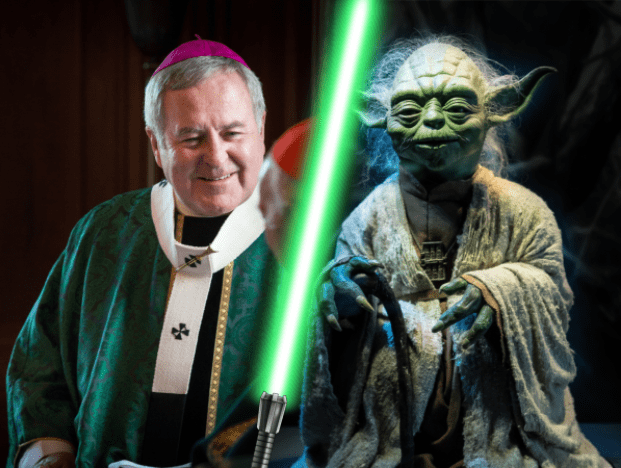New Year’s resolutions seem to fall clunkily in the middle of the school year – with the return to classes, assignments, and squirrely students, the start of the new semester can leave me a bit weary and jaded from frustrations of the first. Amidst my hope for a good start to the semester, two events politely coincided: I saw the newest Star Wars; and I read Bishop Carlson’s op-ed on starting a new year. While seemingly unimportant and unrelated events, the two have left me with some important nuggets to sit with: build my patience, learn from mistakes, and allow love to be the transforming power.
Build My Patience
Freshmen are quite excellent at trying a teacher’s patience. Despite being the first week back, I found myself losing patience with my sixth period. They struggled to sit quietly as I sprinted through material. Though I would like to blame their chattiness on Christmas candy and having been away from school, it was really a result of my trying to pack too much material into a 45-minute period.
My juniors can also try my patience. Our course explores Catholic Social Doctrine and how we apply it in the world today. While we try to unpack complex issues like the school-to-prison pipeline or the gender pay gap, I sometimes grow frustrated and angry by what I perceive as a lack of empathy on their behalf. When students push back, I can sometimes lean toward arguments that shut them down rather than engage them. Instead of dialogue and compassion, I throw more data at them.
Here lies the wisdom of Yoda and Archbishop Carlson: “Patience must you have.” It is very tempting to sprint out of the gate, to give the quickest response we can. Carlson suggests we live by the 24-hour rule, where not responding within 24 hours means you’re irrelevant. Our society as a whole and frequently my own life/teaching employ this rule. But what happens if we wait to respond? The archbishop believes we become more charitable, understanding, and truly listening. How can we be more patient with others? How can we be more open to listening?
Learn from Mistakes
Unironically, becoming more patient will not likely occur overnight. Herein lies Yoda’s second dash of wisdom: “The greatest teacher, failure is.” Sometimes as a teacher, I forget that I’m still learning. I definitely make mistakes (see the absurd length of my freshmen semester exam).The constantly-sprinting lifestyle means that mistakes must be quickly glossed over without much reflection.
Unattended scratches become major damages.
Despite being a third-year teacher and some desire to proclaim myself an expert educator, I must stop and recognize my mistakes not just to fix them, but to let their lessons truly manifest. Herein lies a second part to patience – patience with ourselves. What happens if we allow our patience with others to apply to ourselves as well? Do we take time to allow others and ourselves to learn from mistakes? Are we patient with the learning process?
Allow Love to Be the Transforming Power
Growing in patience and listening points to the transforming power of love. In The Last Jedi, Rose stops Finn from a suicide mission to save the rebel base. As Finn runs to ask her why she would do such a thing, Rose replies, “I saved you, dummy. That’s how we’re gonna win. Not fighting what we hate, saving what we love.” In that scene, Rose boldly summed up the entire Gospel.
My goal as a teacher is not to get freshmen to sit still or juniors to agree with me. Rather, I want to help them experience the transforming power of love and it’s ability to shape the world. Threatening freshmen with boring lectures or hurling statistics at juniors serves only to alienate or frustrate them. And then – they stop learning both the content and the lessons of unconditional love.
But living out that Gospel message will hopefully transform both their learning experience and the world. And so too it is with our own lives. Is love our daily compass? If not, what do we need to do to allow love to be the transforming power? How will love, listening, and learning allow us to be more loving both toward others and ourselves?
****
Perhaps it’s a good thing that the middle of the school year and the start of the calendar year perfectly coincide. It can push us to reflect on the first semester, more fully relying upon the examen for the new year and second semester. Perfect resolutions might not emerge to start the year. Rather, we can focus on slowing down, learning, and letting love take hold. And if we allow ourselves to be gently patient with ourselves and others, we might begin to lead others to the transforming love that is the source of our truest peace.
-//-
The cover photo was made with images from CNS photo/Lisa Johnston, St. Louis Review, and Flickr user William Warby.


